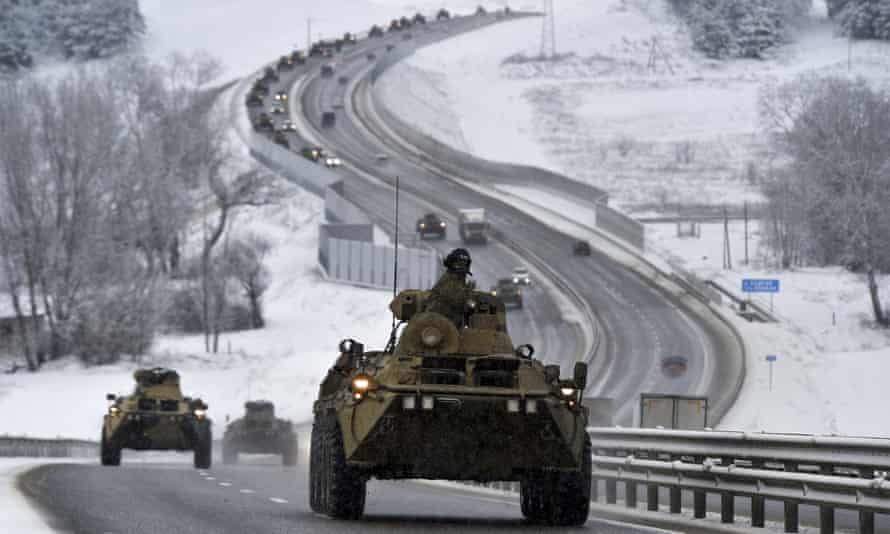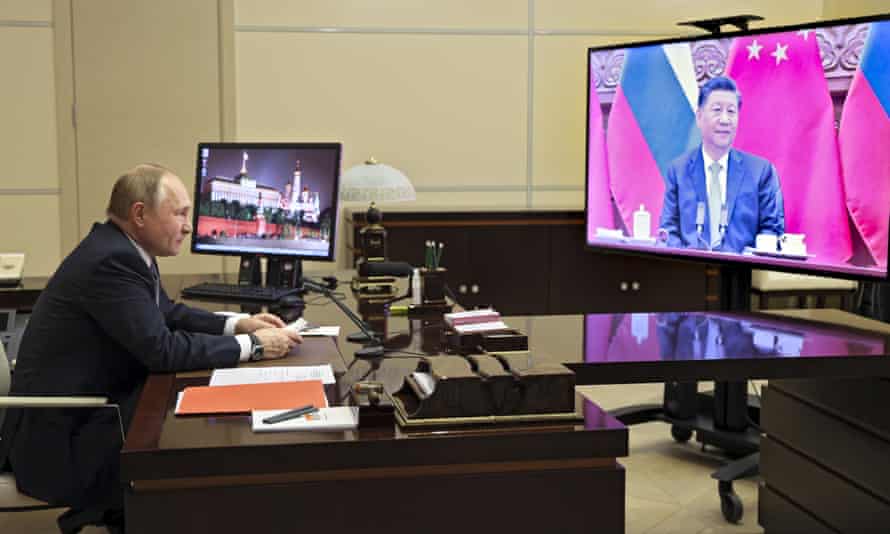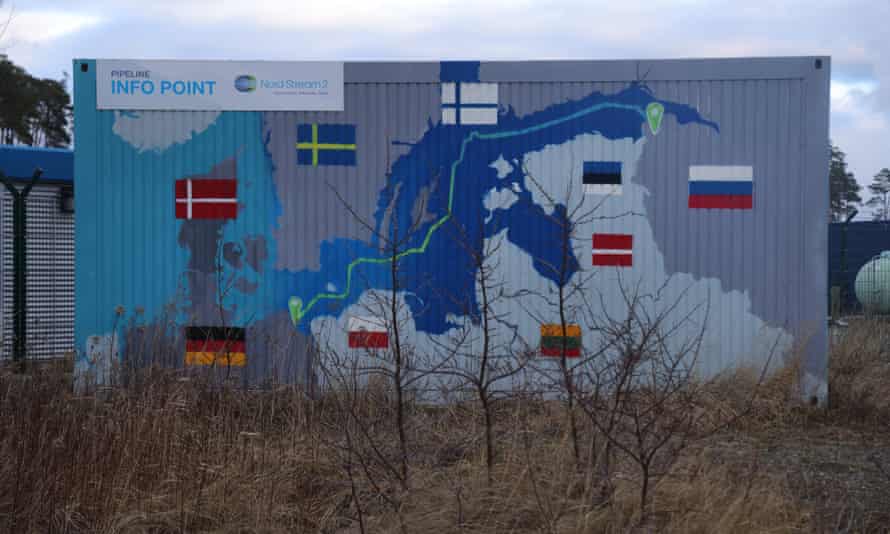When the leaders of China and Russia meet in Beijing this Friday shortly before the opening ceremony of the Winter Olympics, observers of the bilateral relationship will be looking for insights into how this 21st century quasi-alliance is reshaping the postwar world order.
It was 50 years ago this month, on 21 February 1972, that the historic handshake between Richard Nixon and Mao Zedong changed the geometry of the cold war. Historians called the visit “the week that changed the world”. It later influenced Washington’s subsequent movement towards détente with Moscow.
Yet, half a century on, with talk of another cold war – this time between the US and China – on the rise, Moscow and Beijing are, instead, in closerching. Amid the unfolding crisis in Ukraine, Beijing last week publicly seconded Moscow’s “security concerns” regarding Nato. On Thursday, it released a statement saying its and Russia’s foreign ministers had coordinated their positions on regional issues of common concern, including Ukraine, Afghanistan and the Korean peninsular.
“This will be their 38th [meeting] since 2013, [and] is uniquely significant because of the foreign policy challenges each leader is facing at the moment,” David Shullman, senior director of the Global China Hub at the Atlantic Council, said of Vladimir Putin and Xi Jinping.
“Putin appreciates Chinese public expressions of support for Russia’s position on Ukraine that demonstrate the Kremlin is not isolated internationally,” he said. “For China, Putin’s visit is an important demonstration of support at a time when the US, UK, and other countries are undertaking a diplomatic boycott of the Games.”

This week’s meeting will be Xi’s first in-person interaction with a foreign leader in nearly two years. China’s propaganda machine is already in full gear ahead of the event. In state media, the name of the Russian president tops the official list of foreign dignitaries. Earlier this week, the state news agency Xinhua in a long article extolled the friendship between the two countries.
“China-Russia leaders’ ‘Winter Olympics appointment’ opens a new chapter in the bilateral relations,” the headline declared. The article has since been republished by other major state-owned websites in the last few days.
The Xi-Putin meeting will be closely watched in Washington as well as other major western capitals. Inevitably, according to analysts, the issue of Ukraine will grow large. In 2014, in a show of defiance against fierce western criticism over the annexation of Crimea, Putin turned to Xi to look for an alternative. Beijing showed its support by signing a $400bn, 30-year gas deal.
As the crisis in Ukraine brews, Russia is once again facing international pressure and is seeking foreign allies in its standoff with the west. In the current situation, Russia “needs China much more than the other way around”, said Alexander Gabuev, the chair of the Russia in the Asia-Pacific Program at the Carnegie Moscow Centre, during a roundtable discussion on Wednesday.
Describing the mood in Moscow, Gabuev said: “China is very pragmatic and has a lot of leverage … China’s bargaining position is strengthened day by day, so it’s better to sign a deal with China now rather than tomorrow.”
Putin will enter the meeting with Xi looking to do just that. The Kremlin is embarking on the rare foreign visit with a docket of 15 contracts and agreements it wants to sign with the Chinese leadership, including a joint statement that will “reflect the common views of Russia and China on key global issues, including security issues” .
It appears the Kremlin will seek formal Chinese support in its conflict with Nato countries.

“Beijing supports Russia’s demands on security guarantees, China shares the stance that security of one country cannot be ensured by means of damaging another country’s security,” said the Kremlin aide Yuri Ushakov, adding they were calling for the “creation of efficient mechanisms of ensuring security in Europe through negotiations”.
In an article published in the Chinese state news agency Xinhua, Putin also noted joint efforts to expand payments in national currencies and create “mechanisms to offset the negative impact of unilateral sanctions”. US lawmakers have threatened to impose the “mother of all sanctions” if Russia launches a new invasion of Ukraine.
Putin will be accompanied by a handful of top diplomatic and energy officials, including his foreign and energy ministers and the Rosneft chief executive, Igor Sechin. That indicates that economic and energy cooperation are likely to be a focus of the talks on Friday.
Ushakov said the two sides would also discuss plans for the Power of Siberia 2 pipeline, which would allow Russia to redirect gas away from Europe via its controversial Nord Stream 2 pipeline and sell it instead on the Chinese market. However, even if the two sides do strike an agreement, the pipeline would take years to build.
The summit will mark Putin’s third trip abroad since the outbreak of coronavirus in late 2019. The two leaders are expected to hold talks on the morning of 4 February and then have a private lunch that “will help them have a maximally open discussion about the most important international and bilateral issues”, Ushakov said.
Last month, Beijing announced that the bilateral trade between China and Russia reached nearly $147bn last year – more than twice the figure of $68bn back in 2015 after western sanctions. Last week, senior diplomats from both countries agreed to step up coordination on Asian affairs, in the latest move that signaled even closer ties amid western pressures.

“Both Xi and Putin will underscore (yet again) that their relationship is the best it’s been in history and that the two countries continue to deepen strategic and economic ties, with the subtext being that no amount of US-led efforts to derail their leadership or strategic interests will succeed,” said Shullman.
Prof Sharyl Cross, the director of the Kozmetsky Center at St Edward’s University in Austin, Texas, agreed. “The two leaders will emphasize their burgeoning bilateral security and economic ties and common perspectives on a range of global security issues presenting a challenge to American global influence and the liberal international order,” she said, adding that Xi and Putin were likely to also include discussion of the role of Nato in Europe.
Cross said both Moscow and Beijing would stand to benefit from division among democratic nations and the transatlantic security alliance in responding to the Ukraine conflict. “The United States and its allies should be thinking about how to avoid driving these two major powers closer and simultaneous ways challenges on the part of both Russia and China in different regions (Europe and Asia) might be managed,” she said.
But Shi Yinhong, a professor of international relations at Renmin University in Beijing, downplayed the significance of the forthcoming meeting. He said he did not expect anything new to come out of it.
“China has said what it has said about recent events. Beijing’s statements can be seen as very much pro-Russia, but with some major reservations,” he said. “For example, China has never committed to any military involvement in case of a war. And likewise, despite Putin’s previous support for Beijing’s position on Taiwan, he had never committed to be involved militarily in case of a major conflict [between China and the US]either.”
For Shi, the type of foreign dignitaries that descended in Beijing this week is, instead, more telling about the current state of affairs on the eve of the 50th anniversary of Nixon’s visit to Beijing. These leaders range from Putin to Egypt’s president, Abdel Fatah al-Sisi, to the president of Kazakhstan, Kassym-Jomart Tokayev.
“From those who diplomatically boycotted the Winter Games and those who came to Beijing, we can see some indication that the world is indeed heading towards the direction of bi-polarisation.”
www.theguardian.com
George is Digismak’s reported cum editor with 13 years of experience in Journalism